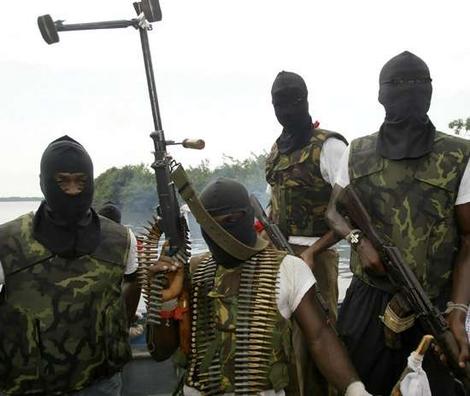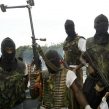
Weapons of War in the Niger Delta
Publication: Terrorism Monitor Volume: 5 Issue: 10
By:

The Niger Delta region of Nigeria, home to large oil and gas operations, is awash with dangerous Small Arms and Light Weapons (SALW). The explosion in activities of non-state armed groups poses a serious threat to residents, the security of the Nigerian state and the booming petro-business in the region. Prominent among the armed groups operating in the oil- and gas-rich, but poverty stricken and under-developed enclave, are the Niger Delta People’s Volunteer Force (NDPVF), the Bush Boys and the Movement for the Emancipation of the Niger Delta (MEND). Some of these groups are political militant groups, demanding an equitable distribution of oil resources, justice and development of the Niger Delta region, while others are gangs and criminal syndicate groups, also called cults or confraternities in Nigeria. All of them tap into the vibrant gun and gang culture in the delta.
Weapons Flood the Delta
From various police and military raids of the groups’ armories and hideouts, or the government initiated disarmament or cash-for-arms programs, weapons have been uncovered in droves. The weapons vary from AK-47s, Czech SAs, light machine guns, Czech Model 26s, Sten MK 2s, Rocket Propelled Grenades (RPG), MAT-49s, MG 36s, Berettas, HK G3s, FN-FALs, home-made guns, pump-action shot guns, G3s, among others [1]. The sophisticated European-made assault rifles and explosives are in the hands of the militant groups like MEND and the Martyrs Brigade. The groups also possess a few M-16s, which are made in the United States. Russia, Germany, Belgium, Serbia, Czechoslovakia, the United States and China are all sources for Nigerian arms (Niger Delta Standard, March 5, 2006).
These weapons—so called SALWs—are brought into the delta from various locations. Most of the assault rifles—such as the Russian AK-47, the German G3, the Belgian FN-FAL, the Czech machine-guns and the Serbian RPGs—are supplied by illegal dealers and sellers. Some of the illegal gun dealers are Nigerians. In October 2006, for example, the Rivers State police command arrested Chris Ndudi Njoku, a 45 year-old businessman who specialized in importing prohibited firearms into Nigeria. In his possession were hundreds of G3s, AK-47s and Beretta automatic rifles [2]. There are also European dealers involved in the trade, but, unlike their Nigerian counterparts, they almost always escape the arm of the law, in some cases due to their connections with powerful figures in various governments (This Day, February 18, 2003).
Nigeria has porous borders on both its land and sea edges, allowing gun smuggling from a variety of African countries. Many of the weapons also come from war-torn countries in Africa. Additionally, poorly paid Nigerian soldiers who have served in peacekeeping missions in other African countries, such as Liberia and Sierra Leone, often return home and sell their weapons to combatants or gun dealers [3]. According to one arms researcher, Babafemi Ojudu, many of the arms smuggling rings operate out of Equatorial Guinea, Gabon, Cameroon and Nigeria (IRIN, May 2006). The smugglers use speed boats to connect with ships on the high seas, and then ferry the arms back to shore. Jailed militant leader Alhaji Dokubo-Asari confirmed this method to reporters in 2005, stating, “We are very close to international waters, and it’s very easy to get weapons from ships” (IRIN, May 2006).
Some of the weapons in the armed groups’ stockpiles are acquired after attacks on police and military outposts. During such attacks, the militant groups break into the police or military armories and cart away arms. There are many cases in which armed groups conduct well-coordinated attacks and kill Nigerian security officials, carting away their weapons. On July 12, 2006, for example, MEND combatants killed four naval personnel and injured three soldiers who were escorting a Chevron oil tanker along Chonomi creeks in the Warri South West Local Government Area of Delta State and in turn confiscated their weapons (The Punch, July 13, 2006). Just this year, in Port Harcourt, the capital of Rivers State, on the eve of the Governorship and House of Assembly elections on April 14, armed militants attacked the Mini-Okoro Elelenwo police stations and carted away recently-arrived AK-47s, killing many police officers during the attack (The Midweek Telegraph, April 18-24). Corrupt security officials also sell weapons to militants. Before the April elections, for example, politicians in Niger State imported massive amounts of arms for their “security detachments” (which also likely went to thugs hired to help rig the elections) (Vanguard, April 13).
Additionally, armed groups thrive on the local oil boom. They carry out oil bunkering (theft) operations, often exchanging bunkered oil for weapons or selling oil and then purchasing guns. Oil money is a significant force behind the proliferation of weapons in the region. Major bunkering groups also supply gangs with weapons and have them act as armed guards while they travel along the waterways and bunkering routes looking for pipelines from which to pilfer oil. Politicians also hire gangs and criminal groups to have them provide security and, during election season, to help intimidate voters to vote a certain way. Many of the politicians purchase their weapons from illegal dealers, helping to fuel the trade.
Apart from the above weapons sources, there are local underground arms manufacturing industries in Awka, the capital of Anambra State in eastern Nigeria. There, local blacksmiths produce weapons popularly called, “Awka made.” The Awka guns cannot be classified as automatic weapons because the quality of the weapons is so poor. Nevertheless, the gun can inflict serious injury or even death on its target at close range.
Attacks in the Delta
The armed groups of the Niger Delta have carried out deadly and paralyzing attacks on oil and gas facilities with their weapons. They have shut down oil production and massacred scores of security officials guarding the facilities and infrastructure. The groups are fighting in familiar terrain which, despite the fact that the security forces are armed, gives the armed groups the upper-hand. They have also taken foreign oil workers hostage—sometimes releasing them only after huge ransoms are paid. The groups often use the ransom money to support their insurrectionary campaigns. These latter activities are always associated with the political-militant groups like the NDPVF, MEND and the Martyrs Brigade.
The armed groups in the delta often conduct their attacks using outboard-engine motorized fiber boats. Some of the speed boats are imported, while some are locally crafted. Most locally-manufactured speed boats are smaller compared to the foreign-made, yet the former can also travel the rough seas. Despite the employment of sophisticated gunboats by the Nigerian military taskforce, insurrectionary campaigns by the militant groups are almost always successful. The success of the militant operations hinges on two factors: the ingenuity of the militant boat drivers who are familiar with the terrain of the creeks’ complex web of streams, and the popular support among the people of the region that the many years of neglect and under-development of the Niger Delta area have fostered.
To reduce the number of weapons in the Niger Delta, there is a need to prevent the flow of weapons from other countries into illegal hands in Nigeria. The local police bureaus must also live up to their responsibility of curtailing the inflow of these illicit guns into the delta. The government should run a credible and transparent security system that, by providing residents with their basic security needs, will discourage them from forming or joining cults or militant formations that are proliferating dangerous SALWs throughout Nigeria
Notes
1. Nicholas Florquin and Eric G. Berman, “Armed and Armless; Security in the ECOWAS Region,” Small Arms Survey, Geneva, 2005. The above weapons are not exhaustive of the guns in the hands of the various groups.
2. “Soldiers, Police Seize High Caliber Rifles in Rivers,” Human Rights News, Centre for Environment, Human Rights and Development (CEHRD), Ogale-Nchia, Eleme, Rivers State, Nigeria, October, 2006.
3. Nicholas Florquin and Eric Berman, “Armed and Armless.”




